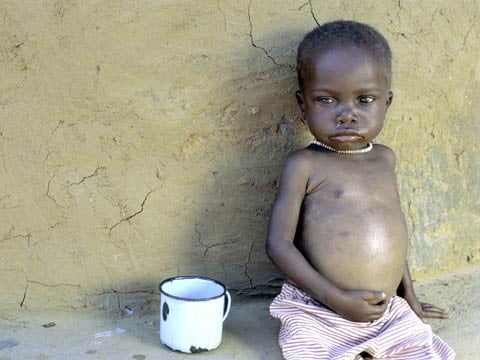 The food crisis has pushed the
The food crisis has pushed the
number of hungry, undernourished people
in the world to almost 1bn, in what
the United Nations’ Food and Agriculture Organisation described on Tuesday as a
“serious setback” to global efforts to
reduce mass starvation.
“The ongoing financial and economic
crisis could tip even more people into hunger and poverty,” the FAO added.
The FAO said the number of
undernourished people rose this year by 40m to about 963m people, after
increasing by 75m in 2007. Before the food crisis, there were already 848m
chronically hungry people in 2003-05. It’s getting worse.
“High food prices are driving
millions of people into food insecurity, worsening conditions for many who were
already food-insecure, and threatening long-term global food security,” the FAO
said in its 2008 report.
The prices of wheat, corn and rice
jumped to record levels earlier this year,
causing food riots in countries from
Haiti to Egypt to Bangladesh and prompting appeals for food aid for more than
30 countries in sub-Saharan Africa.
Although food commodity prices have halved
from this summer’s all-time highs, they remain well above pre-crisis levels.
The cost of rice, for example, has halved since July, but it still trades at
prices that are 95% above 2005 levels.
For 25 years the proportion of the
world’s population on the brink of starvation has gone down. That improvement
has now gone into reverse. The percentage has risen now to about 17%, up from a
record low of 16% in the period 2003-05.
"For millions of people
in developing countries, eating the minimum amount of food every day to live an
active and healthy life is a distant dream," said the FAO’s assistant
director general, Hafez Ghanem. "The structural problems of hunger, like
the lack of access to land, credit and employment, combined with high food
prices remain a dire reality."
The vast majority of the world’s
undernourished people – more than 90m – live in poor countries, according to
FAO estimates. Of these, 65% live
in only seven countries: India,
China, the Democratic Republic of Congo, Bangladesh, Indonesia, Pakistan and Ethiopia.
In sub-Saharan Africa, one in three people – or almost 240m – are chronically
hungry, the highest proportion of undernourished people in the total
population.
Almost a decade ago, world leaders
agreed targets for a halving between 1990 and 2015 in the number of people who go
hungry. Jacques Diouf, FAO director-general, said in a foreword to the report
that the task of achieving the UN’s hunger reduction targets in the remaining
several years to 2015 will “require an enormous and resolute global effort and
concrete actions”.
"This sad reality should not be
acceptable at the dawn of the 21st century," the FAO’s director general,
Jacques Diouf, said in a speech to launch the report. "Not enough has been
done to reduce hunger and not enough is being done to prevent more people
becoming hungry."
Under capitalism none of this is
going to happen. Let’s resolve to build a better world that can feed the
hungry.






